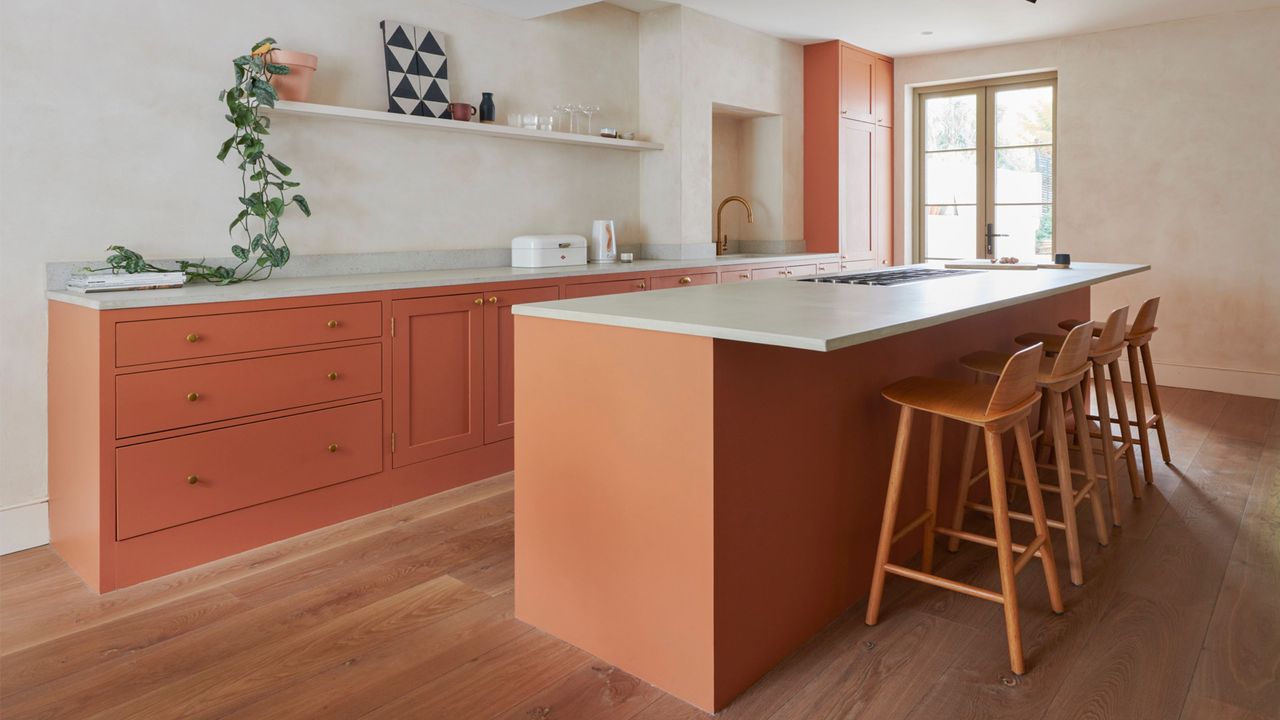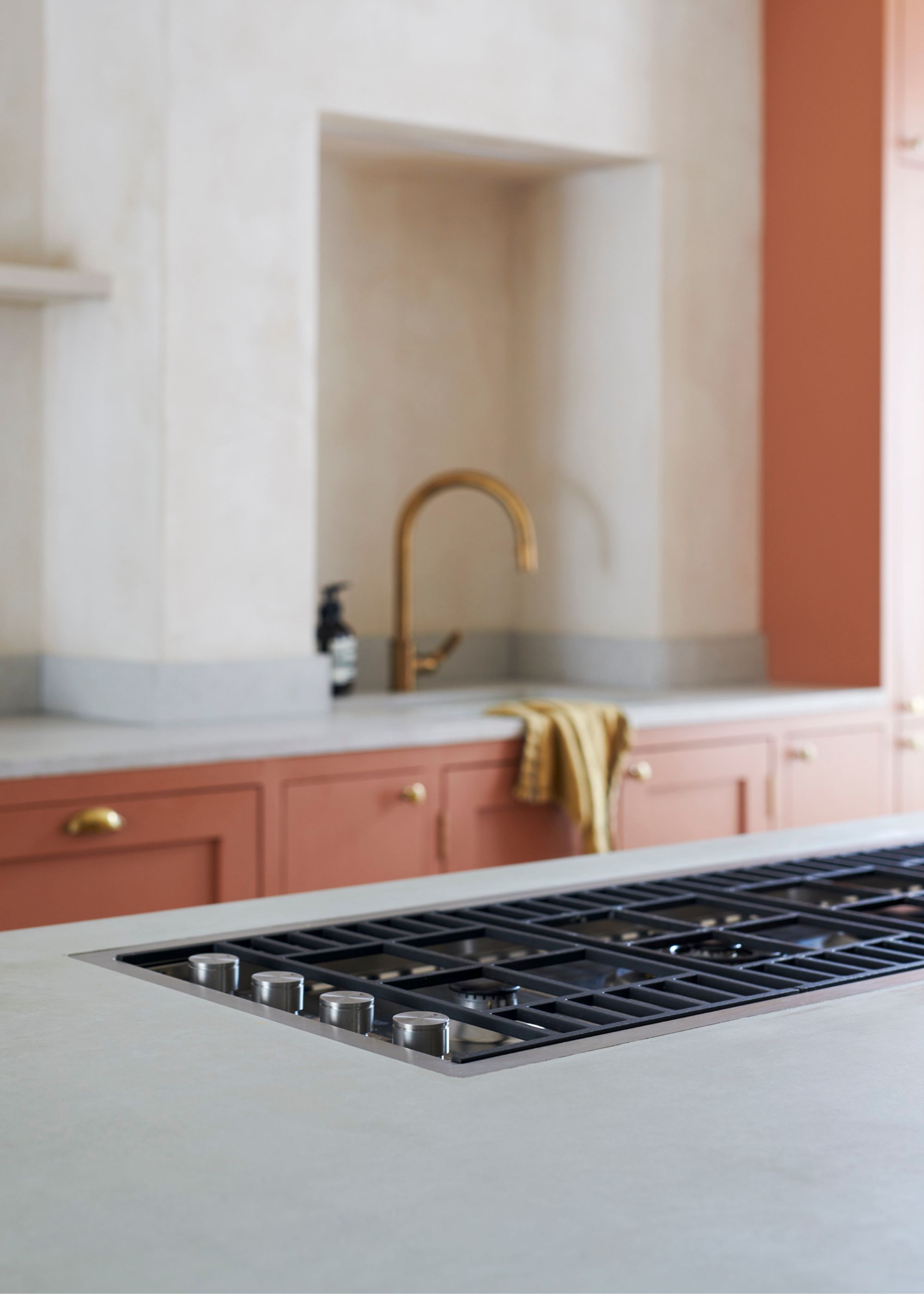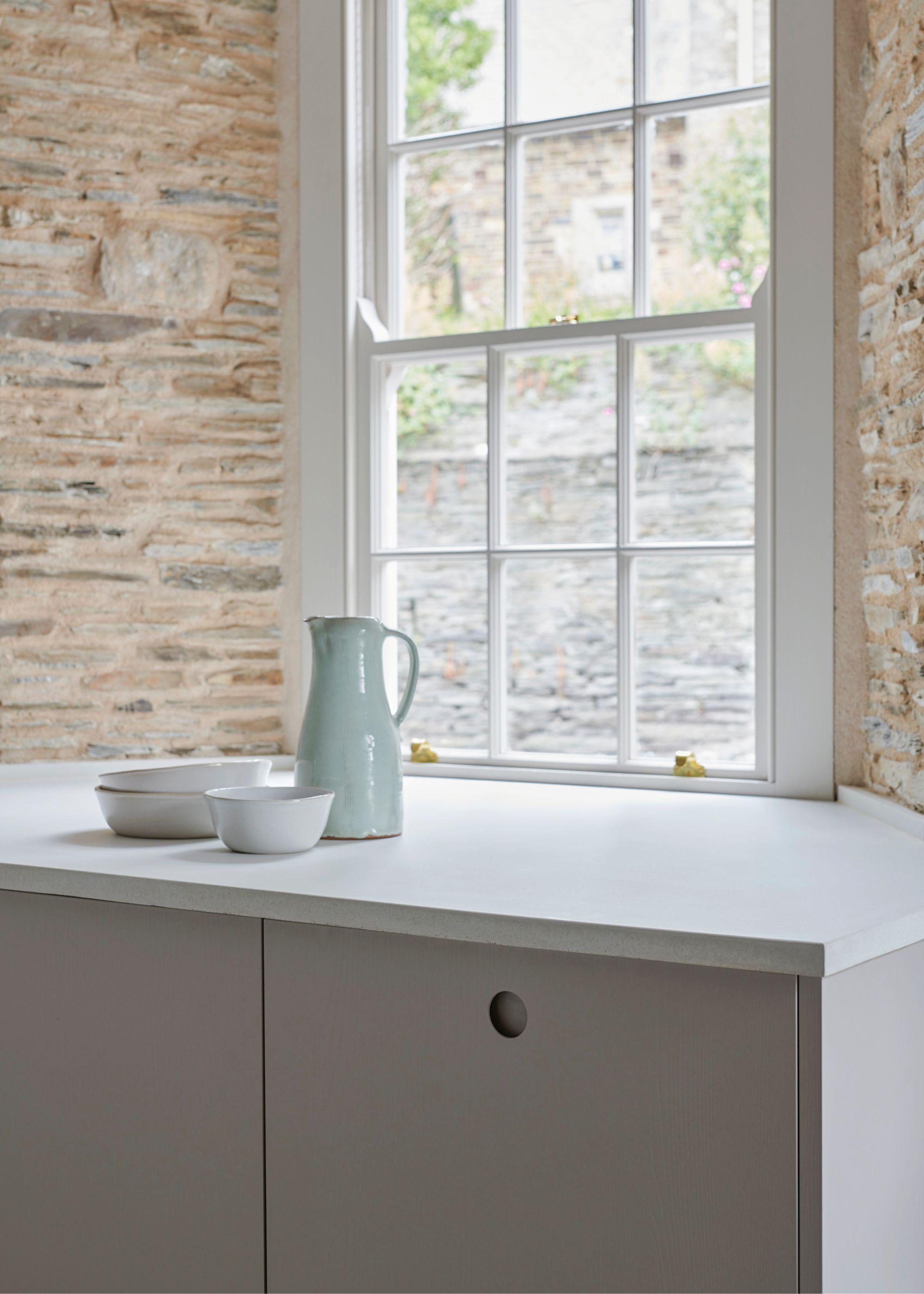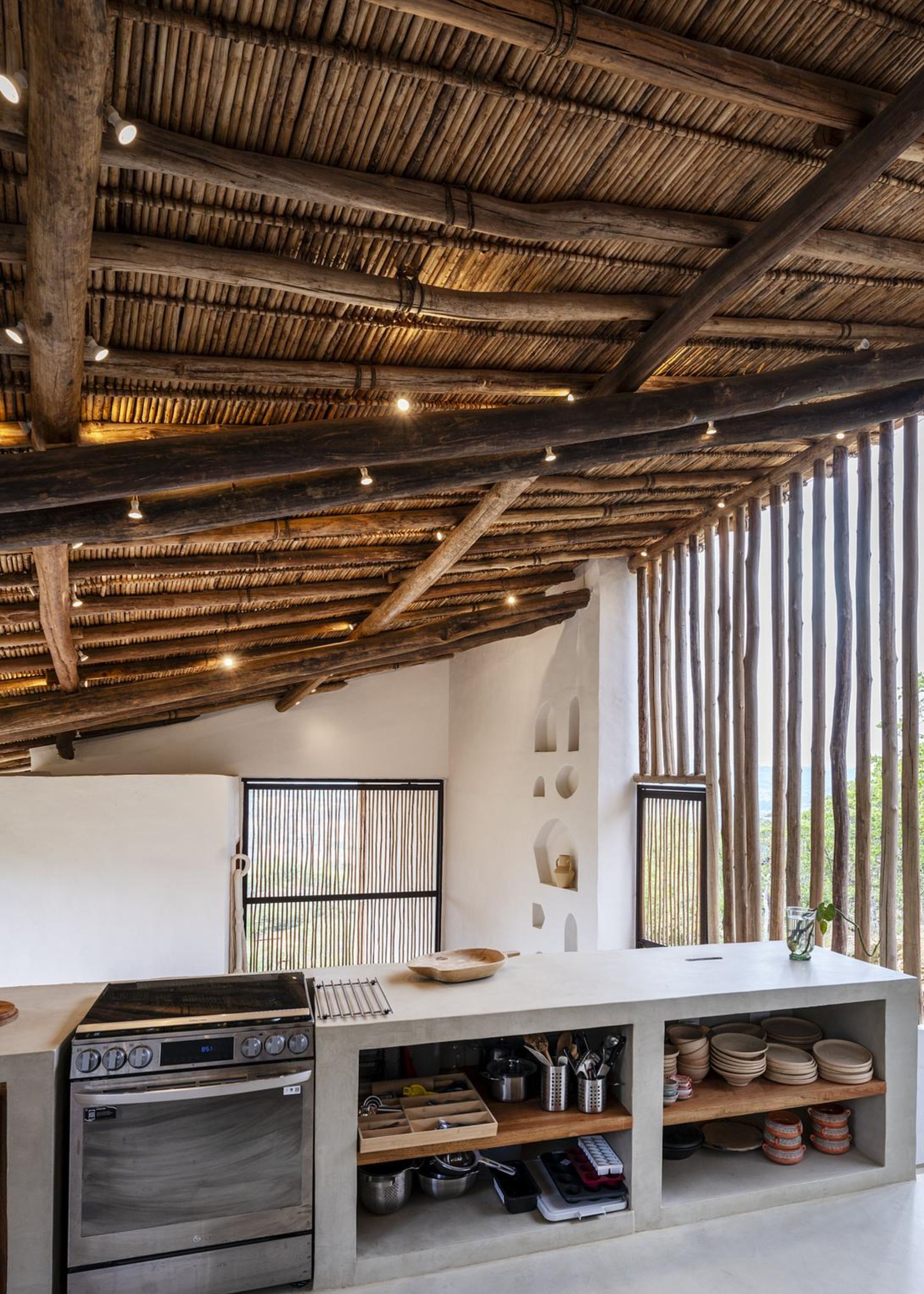
Concrete kitchen countertops have been making the rounds lately throughout design-forward kitchens this year, but is this material really worth it? Known for its versatility, durability, and aesthetic, concrete worktops bring a more industrial style feel into a space and look good while doing so.
However, as with many kitchen countertop materials, there are a few downsides to take note of when adding this to your home. As beautiful, elegant, and sleek as it might look, can concrete worktops really stand the test of time?
To get to the bottom of your kitchen countertop needs, I spoke to Izzy Taylor-Wood, a concrete specialist and managing director at Woody’s Concrete Company. To get you started, she's provided a guide on the pros, cons, and even maintenance needs when it comes to concrete countertops. Here is everything you need to know.
Are Concrete Countertops Any Good?

"When designed and installed well, concrete worktops are a fantastic choice for those seeking a touch of luxury in their homes," Izzy Taylor-Wood, managing director at Woody’s Concrete Company, tells me. "Concrete offers a unique, tactile surface that feels solid yet smooth to touch, and it can be completely customized to suit your personal taste."
However, the expert notes that just like any other worktop, concrete will need a little love and care to keep it looking its best, making it a kitchen countertop mistake for anyone not up to putting in the maintenance work.
"That said, this is not a material for everyone and, like most other surface materials, it will require some maintenance," explains Izzy. "It’s entirely possible to create surfaces that are both beautiful and practical — think subtle variations, bespoke edges, or even decorative elements for a truly personal touch."
What Are the Pros and Cons of Concrete Countertops?

"There are three main advantages to concrete worktops," Izzy says. "First, they are highly customizable, allowing for curves, no visible joins, integrated drains, or decorative inlays, making each surface truly one-of-a-kind."
These kitchen countertops are also quite durable and strong, and "when made with GFRC (glass-fiber reinforced concrete) versus traditional concrete, they are also surprisingly lightweight, which makes installation easier without compromising the premium, solid feel."
Lastly, Izzy says, "When concrete is expertly processed and sealed, its users benefit from excellent stain and heat resistance. Unlike most surfaces, if you have any accidents that result in staining or unwanted blemishes."
Whether you opt for matte or glossy kitchen countertops, there are also some considerations to keep in mind, according to Izzy.
"Concrete is naturally porous, so spills such as oil, wine, or acidic liquids can leave transient staining if the surface isn’t properly sealed and these liquids aren’t wiped clean as they occur," says Izzy. "Small hairline cracks may appear over time as the concrete cures or with structural movement, which are generally cosmetic rather than functional."
Finally, Izzy explains that "while GFRC makes the surface lighter than traditional concrete, installation is still more labor-intensive than some other materials, requiring careful handling and expertise, which can be more costly than standard installations."
With proper care, however, Izzy says a GFRC concrete worktop can last for decades, "with the structural slab remaining strong for 20–40 years and the finish refreshed as needed."
She continues, "Many homeowners love how their surfaces develop a natural patina over time, giving their kitchens a unique character that only improves with age."
Are Concrete Worktops Hard to Maintain?

If you want to bring this material into your small kitchen ideas, then it's important to remember that concrete may need some care and maintenance, but not to worry, as it's not as bad as you think.
"There’s a common misconception that concrete worktops are extremely high maintenance, but in most cases, daily care is very similar to quartz or other popular, luxury surfaces," Izzy tells me. "Because they are an investment, some upkeep is expected, but it’s mostly intuitive and depends on how you use the surface day-to-day."
The essentials are simple, though, Izzy says all you need to do is "clean up spills as they happen, avoid chopping directly on the surface or using sharp implements like scouring pads, and use trivets or mats for hot pans."
Izzy continues, "Beyond that, you can use your preferred gentle surface cleaner. With this kind of care, concrete surfaces age beautifully and can develop a natural patina that is inherent to polished concrete. Essentially, it’s about treating your worktop with the same thoughtful care you would give any valued item in your home."
As a word of advice, Izzy also suggests that if you find your surfaces are particularly vulnerable to watermarking, scratching, or staining, she says it's best to "refer this back to your supplier and always do your own research into the sealant so you feel confident with daily usage."
Add interest to your countertop with this Concrete Jesmonite Salt and Pepper Pot from Etsy. Strong, durable, and sophisticated, what better place to house your spices?
Stay hydrated with this Grova Stoneware Pitcher from Vaunt Design with its timeless figure and beautiful design. Handmade and crafted from stoneware, this pitcher features a rough, tactile texture and a warm brown finish.
It's best to have a home for your everyday kitchen utensils. This Alfredo Speckled Stoneware Utensil Holder is chic in every way. Made from 100% stoneware, this piece is finished off with a sleek hues. What's not to love?
FAQs
What Is the Life Expectancy of Concrete Countertops?
Wondering how long this material might last? Well, Izzy says with the right care and installation, "concrete worktops can last for several decades, often outliving many other countertop materials. The structural slab itself is extremely durable, while the finish may need refreshing or resealing from time to time, depending on how the surface is used."
She adds, "Many clients choose to refurbish rather than replace, meaning a single worktop can serve beautifully for 20–40 years or more. This longevity is part of what makes concrete an increasingly attractive choice. When manufactured responsibly, it offers a sustainable option in a market where frequent replacement has become the norm. At Woody’s, we have installations more than ten years old that are still going strong after only minor refinishing, and we expect them to last for many years to come."
Can I Put a Hot Pan on My Concrete Worktop?
"Concrete itself is naturally very heat-resistant, so it typically won’t burn or warp like wood or laminate, and it can tolerate the temperatures most cookware produces with ease," Izzy tells me.
However, the only vulnerability lies in the protective sealer, according to Izzy, "which can discolour or mark if exposed to very high heat for too long. As with most installers, our guidance is to take extra care by using a trivet or heat-protective mat for hot pans. This precaution helps preserve the finish and ensures your concrete surface remains protected by the sealant."
If you're planning your kitchen renovation and wondering what countertops might work best, check out my guide on the pros and cons of quartz worktops, too.







